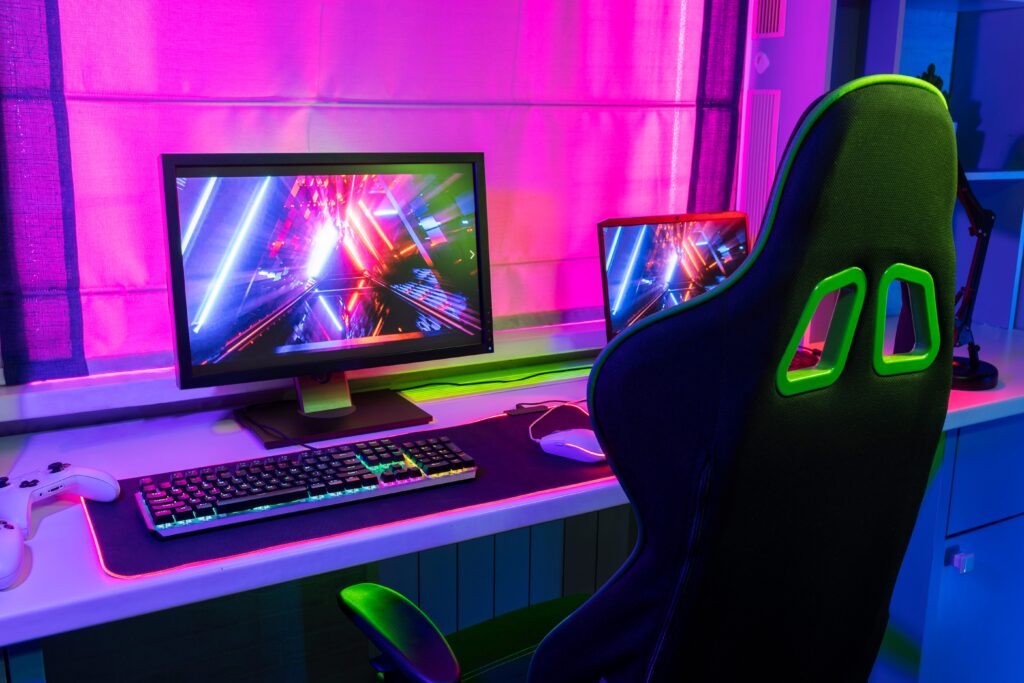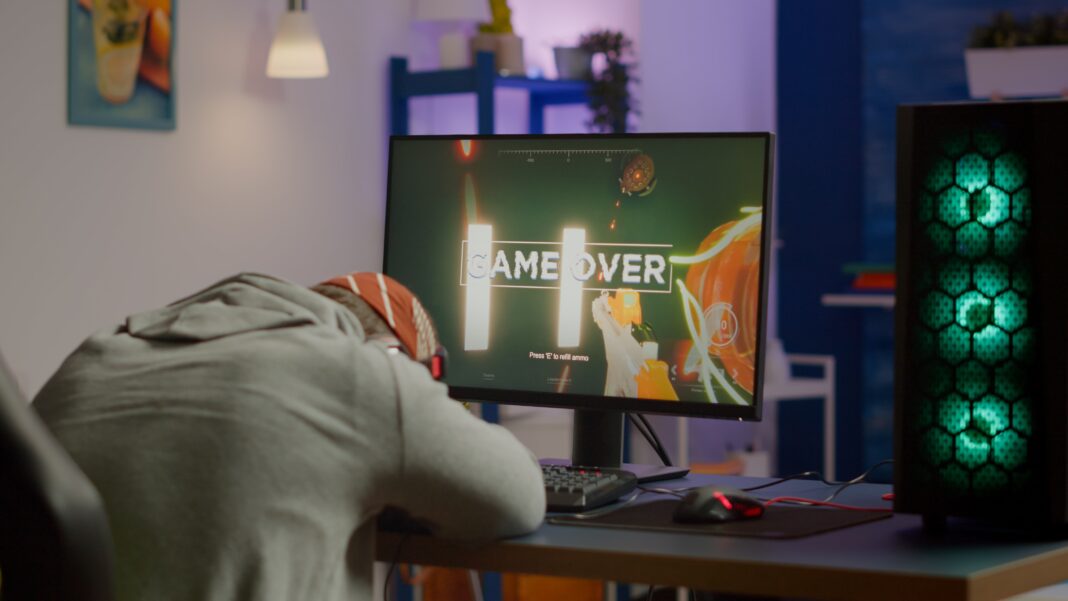Stress is an unavoidable part of modern life, affecting people of all ages and backgrounds. While traditional stress-relief methods such as exercise, meditation, and therapy remain effective, an unexpected tool has emerged as a powerful ally in combating stress: video games.
Contrary to outdated stereotypes that label gaming as a mindless or harmful activity, numerous studies now confirm that gaming can significantly reduce stress levels when approached mindfully. From immersive open-world adventures to fast-paced competitive games, different genres offer unique psychological benefits that help players unwind, refocus, and even improve emotional resilience.

This comprehensive guide explores the science behind gaming and stress relief, the best types of games for relaxation, potential risks, and practical strategies to maximize gaming’s benefits. Whether you’re a casual player or a dedicated gamer, understanding how to use gaming as a stress-management tool can transform your mental well-being.
The Science Behind Gaming and Stress Reduction
1. The Role of Dopamine and Endorphins
Gaming stimulates the brain’s reward system by triggering the release of dopamine, a neurotransmitter associated with pleasure and motivation. When players complete challenges, level up, or achieve in-game goals, their brains receive small bursts of dopamine, which can counteract stress hormones like cortisol.
A study published in Frontiers in Psychology (2021) found that participants who played casual games for just 20 minutes experienced a 17% reduction in cortisol levels, comparable to the effects of light exercise. Additionally, fast-paced action games release endorphins—natural painkillers that promote relaxation and euphoria.
2. The Flow State: How Gaming Promotes Mindfulness
Psychologist Mihaly Csikszentmihalyi’s concept of “flow state” describes a mental state where a person is fully immersed in an activity, losing track of time and external worries. Many games—especially those with balanced difficulty curves—induce this state, effectively acting as a form of digital meditation.
Puzzle games (Tetris, Portal), strategy games (Civilization, StarCraft), and even rhythm games (Beat Saber, Guitar Hero) require intense focus, diverting attention away from real-life stressors. Unlike passive entertainment (like TV), gaming demands active engagement, making it a more effective mental escape.
3. Social Connection in Multiplayer Games
Loneliness and social isolation are major contributors to chronic stress. Multiplayer and cooperative games (Among Us, Minecraft, World of Warcraft) provide a sense of community, allowing players to interact, collaborate, and build friendships in virtual spaces.
Research from the University of California, Irvine (2020) found that gamers who played socially interactive games reported lower levels of anxiety and depression compared to those who played alone. Voice chat and team-based objectives foster camaraderie, replicating the stress-relieving effects of in-person socializing.
4. Catharsis Through Gameplay
Some stress relief comes from emotional release. Games with combat or high-intensity mechanics (Doom, Dark Souls, Call of Duty) allow players to vent frustration in a controlled environment. The adrenaline rush from competitive gaming can mimic the “fight or flight” response, helping the body process stress without real-world consequences.
A study in Computers in Human Behavior (2019) found that players who engaged in short bursts of action gaming reported improved mood regulation and reduced aggression, debunking the myth that violent games increase real-world stress.
Best Types of Games for Stress Relief (In-Depth Breakdown)
1. Puzzle & Logic Games – Sharpening the Mind While Relaxing It
Games like:
- Tetris
- Portal
- The Witness
- Sudoku
Why They Work:
These games engage the prefrontal cortex, improving problem-solving skills while providing a low-pressure mental workout. The repetitive, pattern-based nature of puzzle games has been compared to mindfulness exercises, helping players enter a meditative state.
A 2023 study in Psychological Science found that playing Tetris for 30 minutes reduced intrusive thoughts (a common symptom of stress) by 42%.
2. Open-World & Exploration Games – Escapism at Its Finest
Examples:
- The Legend of Zelda: Breath of the Wild
- Red Dead Redemption 2
- Elden Ring
- No Man’s Sky
Why They Work:
Open-world games offer freedom, discovery, and a sense of control—three elements that counteract stress. The ability to explore at one’s own pace, without strict objectives, creates a therapeutic experience.
Researchers at Oxford University (2022) found that players who spent time in virtual natural environments (like Skyrim’s forests) experienced lower heart rates and reduced muscle tension, similar to the effects of a nature walk.
3. Casual & Relaxing Games – Low-Stakes Comfort
Examples:
- Stardew Valley
- Animal Crossing
- Journey
- Unpacking
Why They Work:
These games emphasize slow pacing, soothing visuals, and calming soundtracks, making them ideal for winding down. Stardew Valley, for instance, combines farming simulation with social interactions, offering a structured yet stress-free routine.
A 2021 study in JMIR Mental Health found that participants who played Animal Crossing: New Horizons for 30 minutes daily reported significant decreases in anxiety levels over four weeks.
4. Social & Cooperative Games – Stress Relief Through Connection
Examples:
- Among Us
- Fortnite (Creative Mode)
- Minecraft (Multiplayer)
- Destiny 2
Why They Work:
Social interaction is a proven stress reducer, and multiplayer games provide a low-pressure way to connect. Cooperative gameplay encourages teamwork, while voice chat allows for casual conversation, reducing feelings of isolation.
A Microsoft Gaming Study (2023) revealed that 68% of gamers felt less stressed after playing with friends, even in competitive games, as long as the focus was on fun rather than winning.
5. Rhythm & Music Games – Syncing Movement with Relaxation
Examples:
- Beat Saber
- Dance Dance Revolution
- Guitar Hero
- Thumper
Why They Work:
Rhythm games combine physical movement, hand-eye coordination, and musical immersion, creating a full-body stress-relief experience. The repetitive motions and beat-matching mechanics induce a flow state, similar to dancing or drumming.
A Stanford University study (2022) found that players of Beat Saber experienced endorphin releases comparable to a 20-minute jog, making it an excellent option for stress relief without high-intensity exercise.
Potential Risks of Gaming for Stress Relief (And How to Avoid Them)
While gaming can be a powerful stress-management tool, excessive or unbalanced play can lead to negative effects:
1. Sleep Disruption
- Problem: Blue light from screens suppresses melatonin, disrupting sleep cycles.
- Solution: Avoid gaming 1-2 hours before bed, use blue light filters, or switch to non-screen activities (audiobooks, music).
2. Gaming Addiction & Escapism
- Problem: Using games to avoid real-life responsibilities can worsen stress long-term.
- Solution: Set strict time limits (e.g., 1-2 hours max per day) and balance gaming with other stress-relief methods.
3. Increased Stress from Competitive Games
- Problem: Ranked modes in League of Legends, Valorant, or Call of Duty can heighten frustration if taken too seriously.
- Solution: Stick to casual modes, mute toxic players, or take breaks after intense sessions.
4. Physical Strain (Eye Fatigue, Posture Issues)
- Problem: Long sessions can cause eye strain, headaches, and back pain.
- Solution: Follow the 20-20-20 rule (every 20 minutes, look at something 20 feet away for 20 seconds). Use ergonomic chairs and adjust screen brightness.
Practical Tips for Using Gaming as a Stress-Relief Tool
- Schedule Gaming Like a Therapy Session
- Dedicate 30-60 minutes per day as a structured break rather than an endless time sink.
- Choose Games Based on Your Stress Type
- Mental fatigue? Try puzzle games (Tetris, The Witness).
- Pent-up energy? Play action games (Doom Eternal, Hades).
- Need relaxation? Pick calming games (Stardew Valley, Journey).
- Play with Friends for Social Benefits
- Cooperative games (It Takes Two, Minecraft) enhance social bonding, reducing loneliness-related stress.
- Avoid Gaming When Angry or Overwhelmed
- Competitive games can amplify frustration if played in a bad mood. Opt for single-player exploration instead.
- Combine Gaming with Other Stress-Relief Methods
- Pair gaming with light stretching, deep breathing, or a warm drink for maximum relaxation.
FAQ: Gaming and Stress Relief
Q1: Can gaming replace therapy for chronic stress?
A: No. While gaming can supplement stress management, severe anxiety or depression should be addressed by a mental health professional.
Q2: How long should I play to relieve stress?
A: 30-60 minutes is ideal. Beyond 2 hours, benefits diminish, and risks (eye strain, escapism) increase.
Q3: Are violent games bad for stress?
A: It depends. Some players find them cathartic, while others feel more agitated. Choose games that match your mood.
Q4: Can mobile games reduce stress?
A: Yes! Short sessions of Candy Crush, Monument Valley, or Alto’s Odyssey can be effective quick stress relievers.
Q5: What if I don’t enjoy gaming?
A: Stress relief is personal. If gaming doesn’t work, try music, art, exercise, or nature walks instead.
Conclusion: Gaming as a Legitimate Stress-Management Tool
Gaming, when used intentionally, is more than just entertainment—it’s a science-backed method for reducing stress. From dopamine-driven rewards to immersive flow states, the psychological benefits are well-documented.
The key is balance: choosing the right games, setting time limits, and integrating gaming into a broader stress-relief strategy. Whether you prefer slow-paced farming sims or adrenaline-pumping shooters, there’s a game that can help you unwind.
Ready to game your stress away? Start with a 30-minute session tonight and observe the difference. Share your favorite stress-relief games in the comments!

